Object PronounsAn object pronounis a kind of personal pronoun. This type of pronoun is typically employed as a grammatical object, such as the verbs direct or indirect objects or the preposition's object. Despite the fact they are indirect object pronoun or direct object pronoun; such pronouns always accept the objective case. 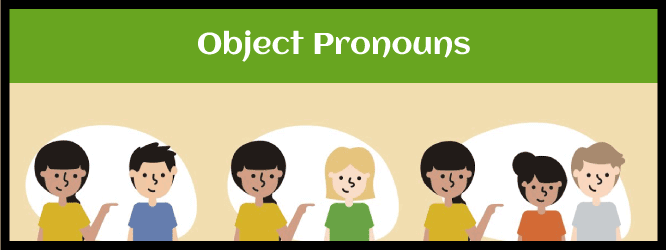
An object pronoun is also not the sentence's or statement's subject. Typically, the subject of the statement affects the object in some manner.It may be difficult to grasp this term, but you may be amazed at how many object pronouns you are using in your daily life. Definition of - Object PronounsIn a statement, an object pronoun is a term that substitutes a noun. The noun it substitutes cannot be the statement's subject. Alternatively, it takes the place of an object noun, which is a noun that has gained verbal action. Object pronoun is also known as objective pronoun. The pronouns that take the action in a statement are known as object pronouns. They are me, you, him, her, us, them, and whom. Any noun in the statement that receives an action, like these pronouns, is an object and is classified as an objective case. The object pronouns could also be placed or positioned after the preposition, i.e., "I will walk with him." Thus, Object pronouns are intended to convey what the subject affects, but they can also be used to minimize repetitions. They are positioned after verbs and prepositions and vary in gender and number. 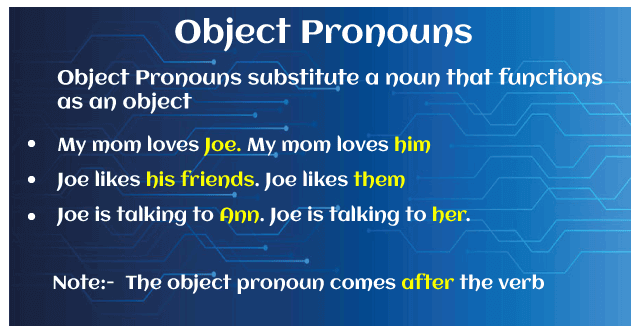
We will only look at nouns as receivers or recipients in this post because they are the most commonly misunderstood. With a few exceptions, English grammar mandates that objects come after the verb in a sentence. I give them biscuits once a week. In this statement, "I" is the actor or the performer (subject pronoun) performing the activity of making (verb). "Them" is the noun to which the item is being given; it is the object. You would never use a subject word after "give" in this context. The following improper statement should grate on the ears of most fluent speakers and even English learners: I give they biscuits once a week. This statement is absolutely incorrect. That was terrible. Right? Now consider the following scenario: They gave Nick and I much more pastries.- Incorrect Can you identify the issue? "I," like "they," is a subject noun that replaces and takes position of the object nouns. The object pronoun "me" should come after the verb in the proper sentence: They gave Nick and me much more pastries.- Correct One must be able to substitute me with any other object pronouns and have a crisp/ clear statement to test for the right case. It is important to note here that object nouns are often the recipients in statements. Object nouns should be used when an action occurs to a noun. Types or Forms Of Object PronounsWhen employed as object pronouns instead of subject pronouns, the seven fundamental pronouns take on distinct forms: Let us have a look at the forms and kinds;
Now using these and understanding them can be tough, but not when you are aware of its rules and basic practices. 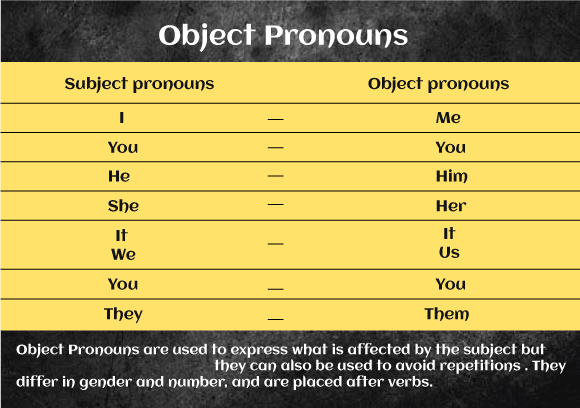
If you understand and are aware of how to discover the objects of the statement, you'll have no trouble identifying the object pronouns whenever you view them.
How to Recognize an Object NounTo recognize an object noun, you must first determine which noun receives the verb's action in the statement. Consider the following sentence: Sarah enjoyed the frozen yogurt. (noun object) The sentence's subject is Sarah, whereas enjoyed the frozen yogurt is the predicate. The verb is "enjoyed," and the objective noun is "frozen yogurt." Using an Object Pronoun instead of an Object Noun You'll understand which word can be substituted by an appropriate object pronoun once you've recognized the objective noun. The word "frozen yogurt" can be replaced with an object pronoun in the instance statement. 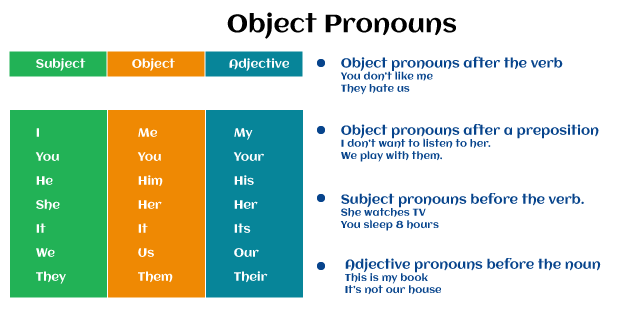
Mary enjoyed it. (adjective pronoun) This statement acts in the similar manner as the above-mentioned statements, with the exception that the word "it" serves as the object pronouns.Simply explained, the main noun, or subject, of the phrase has an effect on the pronoun. Hope this gives you an idea of how to identify, recognize and use object pronouns. Subject Pronoun vs. Object PronounThe word "it" is used in the preceding case, which is significant. This is all well and good, except that "it" can be both a normal subject pronoun and an object pronoun. Have a look at the below-mentioned two statements: It is my favorite movie. (subject pronoun) I love to watch it. (object pronoun) The word it serves as the subject pronoun in the first statement. "It" serves as the object pronoun in the second statement. Other pronouns don't work for it over here. Examine the following sentences to see if you understand the concept: She is a beautiful person. (subject pronoun) Jessica is eager to meet her. (object pronoun) "She" is a subject pronoun in the first instance statement. In the second scenario, "her" appears to refer to the same person, yet it is a pronoun in a different context. It is, in other terms, an object pronoun. 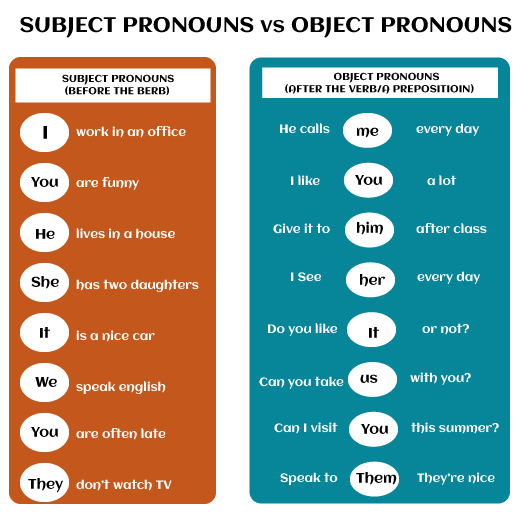
More Techniques for Perfecting Object PronounsRecognizing and choosing subject and object pronoun in the already written statements or phrases is an ideal way to practice these types of pronouns. Apart from this it is also beneficial using a range of other methods and techniques.
Whether to utilize She and I? or me and her? or She and Me?When dealing with two pronouns at the same time, things can get complicated. Should people use she and I? Should they use me and her? Should they use she or me? But there are a few of ways of making this simpler and easier. 1. To begin, do not mix the forms. Both pronouns can be used in either the subjective or objective scenarios. She and I went to the mall.- correct You can ask either her or me if you have any doubts.- correct She and me are long-time buddies.- incorrect 2. Second, try removing one of the pronouns from the statement to determine whether to include subjective or objective cases. I went to the mall.- correct Me went to the mall- incorrect She and I went to the mall- correct Her and me went to the mall- incorrect Examples Of Object PronounThe object pronoun has been highlighted in the following sentences for easy recognition.
Thus Object Pronouns Usage; We employ an object pronoun
SummaryThus, Object pronouns are employed to communicate what the subject affects, but they can also be employed to avoid repetitions. They are positioned after verbs and prepositions and vary in gender and number. They are as follows: me, you, him, her, it, us, you, and them. As an example: - "My pups get very delighted when I take them to the playground." My pups are referred to as "them." - "I offered him a peck for you." = Him is used rather than an individual name. Thus, we have explained all the rules, usage and types of object pronouns in our above mentioned post. Practicing this type of pronoun will help you understand and use it more accurately and precisely. So, practice often to get hold of the concept.
Next TopicReciprocal Pronouns
|
 For Videos Join Our Youtube Channel: Join Now
For Videos Join Our Youtube Channel: Join Now
Feedback
- Send your Feedback to [email protected]
Help Others, Please Share









